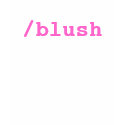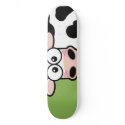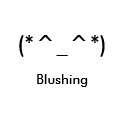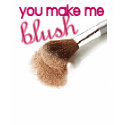Have you ever asked yourself: “Why do I blush when I’m embarrassed?” or “Why do I blush when I’m angry?”
How does blushing work? Is there a reason for it? And can we control it and stop a blush before it embarrasses us further?If you’re impatient for an answer, for the short answer scroll below to where I’ve written:
** SCROLL DOWN TO HERE FOR THE DIRECT ANSWER**
If you want the more thorough answer.. read on!
All things that make us blush have one thing in common…
If you think about it, there are a limited number of emotions that make us blush, including embarrassment, nervousness, anger, fear and feeling defensive.
All these have one important factor in common: All these emotions switch on the part of our nervous system which is used for “fight-or-flight” (the sympathetic nervous system). The sympathetic part of the nervous system makes your body release stress hormones like adrenaline, which have all sorts of effects on how we feel. All these effects were carefully desgined in evolution to help us run or fight when a threat appears. In caveman times, it served to help us evade man-eating animals. For example, these effects include
- Increased heart rate – allowing the blood to get to your brain faster so you can think on your feet, and bringing blood to muscles to supply it with a continuous supply of nutrients if you’re using them to run.
- Increased breathing rate – to allow you to make energy (which you make in the process of respiration) to give you energy for running.
- Increased pupil size in our eyes – allowing us to see better when we need to see an exit route for survival
- Increased sweating
- Diverted blood flow to our muscles and brain – non-essential organs for running away, like digestive organs, have less blood flow, to allow more blood and energy to be used for the more pressing needs of escape.
Blushing is also part of the fight-or-flight response.
When a moderate amount of adrenaline is made, it makes the blood vessels in your face dilate, and you blush. As the blood flows to your face, you can feel that familiar warmth rising… and you start feeling like a pretty good candidate to replace Rudolph on Santa’s sleigh.
“I’m not convinced… why would I need to engage the fight-or-flight response that evolved to run away from man-eating tigers and stuff if I’m blushing in response to public speaking or something?”
Our body can’t tell that there’s much difference between life-threatening situations, and reputation-threatening situations.
All kinds of threat are felt by the body as “stress”, more or less equally. So whether you’re doing a spot of public speaking or whether you’re running for your life from a man-eating blob, your body will respond in quite a similar way.
Fear is the main emotion underlying blushing
If you strip down all the emotions that trigger blushing, you’ll find that in all those situations there is fear, caused by feeling under threat.
For example:
- When you’re running late for a meeting, and you blush as you feel people glaring at you as you slide in late , there’s fear there. What fear? Fear that running late damages your self-image. Maybe it’ll look like you’re irresponsible, or unreliable. Maybe it’ll mean you will be penalized for it down the line next time someone’s up for a promotion.
- When blushing whilst giving a speech, there is fear there too. What fear? Fear of going blank. Fear of saying the wrong thing. Fear of boring the audience. Fear of damaging your self-image and being tagged as a bad speaker, or as incompetent.
- When someone insults you or criticizes you, and you blush in response, the fear driving this is a threat to your self-image. The fear is that people will think of you in a negative way; a social threat.
- Blushing in response to a public compliment is also often driven by fear. Fear of inducing jealousy or resentment. At other times, it’s driven by surprise, which is an emotion that is closely linked to fear. (Studies show that people can find it hard to differentiate surprise from fear in photos)
- Blushing in response to a romantic advance could be related to fear: Depending on the situation it could be fear of an unwanted advance or fear of displaying any inadequacies and not meeting the other person’s expectations. It could again be linked to surprise. Or, it may be quite a different kind of blush: the sexual arousal blush which is a whole other story.
“OK, so blushing is linked to fear and fight-or-flight, but why would turning red-faced be advantageous in such situations?”
Before I answer this question let me put a spanner in the works:
When there’s a really serious, life-threatening situation, it’s actually most common for people to go white. Not red.
This is all to do with slight differences in the amount of adrenaline you make depending on the size of the threat.
When there’s a mild threat, like embarrassment, a moderate adrenaline rush causes facial blood vessels to dilate, as we’ve discussed, and you go red.
When there’s a really severe threat to your life, a much higher amount of adrenaline is made, diverting as much blood as possible to your muscles and brain, and not to the face, thus making you appear pale.
This is actually a fairly good way to tell if someone is really agitated vs mildly agitated. If they’ve gone past red, to white – it’s serious!
What is clear from this observation, is that going *white* would help you run away from a threat, but going red doesn’t.
“So if we don’t go red to help us run away, why DO we go red?”
** SCROLL DOWN TO HERE FOR THE DIRECT ANSWER**
People have come up with 2 main theories for why we go red:
1.) In the case of embarrassment: Glowing like a red beacon informs people that you know you’ve done wrong so they are more likely to forgive you. Aren’t we all more likely to forgive someone who has seen the error of their ways and wants to do better, than someone who doesn’t seem to care at all?
2.) In the case of anger: It’s a warning light! The red colouring is saying: “I’m feeling threatened! Beware! I may get aggressive!” This is evolutionarily advantageous because it can scare your opponent away, taking away the threat.
How do I Stop Blushing? Is there a way?
Now that we’ve seen that most blushing arises from feeling fearful and under threat, we can tackle it! The key is learning to conquer fear, so that the previously-seen dangerous situation is now seen as safe.
To prove that this works, think about babies: Babies, have no sense of danger, right and wrong, or social expectations or consequences. As a result they have little fear in situations which make adults blush… and yet a baby in these exact same situations will not blush.
Learning to see a situation which you feel is fear-inducing or threatening, as safe, takes some time and effort. The main key is carrying out mental reprogramming using tools like positive self-talk, self-esteem-building and building strong internal loci of control, which may be aided by a qualified therapist.
To help you on your journey, I would strongly recommend picking up some self-help books on the subject that deals with the issues that are individual to you. Some books on blushing are given below in the “related products” section.
Another tool to help is the gentle homeopathic-like effect of flower essences which can help tune down feelings that lead to blushing. You can use Bach Flower Rescue Remedy whenever you feel anxious or panicked. (For US visitors you can buy it here
; for UK visitors you can buy it here).
There is another Bach flower called Mimulus which is specific for fear of known cause (Places to buy in the US ; in the UK). There is also the Bach flower, Aspen (US
; UK) when the source of the fear is unknown, and Bach flower, Larch (US
; UK) to help with confidence. I would suggest reading about each essence online and see what sounds most fitting for you. If you want to try out different flower essences other than Bach, you can experiment and see what works best for you. For example, Australian Bush Essences are known to be very strong, and there is another company called Pacific Essences which makes “Fearlessness” essence.
If you’d rather try out essential oils, the oil Valor by Young Living is great for giving you a boost of valor when you need it. You can take a whiff of it, or rub it where you desire, e.g. on your chest, wrists, or if you’d rather people won’t be able to smell it, you can rub some on the soles of your feet. Young Living’s Joy oil
works on a similar principle and may also help in times when blushing might occur.
In the event of anger, breathing exercises, and counting slowly to 10 can help calm you down in the short-term when agitated. People who generally have short fuses and are prone to blushing red with tempers, may benefit from the Bach flower Holly (US
; UK).
Ultimately, the key is the long-term establishment of a new ways of thought that tell you there is nothing to fear in situations which you currently find scary. Self-help books or a therapist can again help guide you here. It may not be a solution that works at the click of your fingers, it takes some time, but it’s the most effective path that treats the problem from the root cause.
Related Products
Note:
This site is working in affiliation with Amazon.com (for USA visitors) and zazzle. If you like a product that was recommended anywhere on this website, please consider buying these products via the links on this site, to help keep this website running. Thanks ![]()







“Blushing in response to a public compliment is also often driven by fear. Fear of inducing jealousy or resentment. At other times, it’s driven by surprise, which is an emotion that is closely linked to fear. (Studies show that people can find it hard to differentiate surprise from fear in photos)”…
I’ve been trying to figure this one out for a long time, since I blush when singled-out even when it doesn’t make sense (like getting complemented in meetings). Thank you!
Thanks for writing such an easy-to-understand article on this topic.
i too suffer from this red face and i hate it! evrteyime i meet a new person i turn red when i talk to them! Also the comment about being in a colder place is true!!!! It also happens to me when i think i might be wrong about something .i have heard of people taking citalopram for this but have never tried it. I can be having an conversation with someone and we talk about sex or something embarrasing and bam i turn red! so you all are not alone even though it seems so! i always know i will turn red so i try to avoid scenarios that will make it happen and also avoid people talking to me which SUCKS because i love to joke and laugh
Hi, Neat post. Fantastic writing. It will help me with my blushing problem.
I don’t think people should be ashamed when they blush. I think it’s cute. It shows that you’re a sensitive, modest soul.
Very interesting article. Thanks!
I recently read a book which was recommended on a social anxiety website which I found extremely helpful in helping me to deal with blushing. I bought it from Amazon, but noticed it wasn’t on the list above, so if anyone is interested it’s called:
BLUSH And Be Happy: A practical guide to overcoming your fear of blushing!